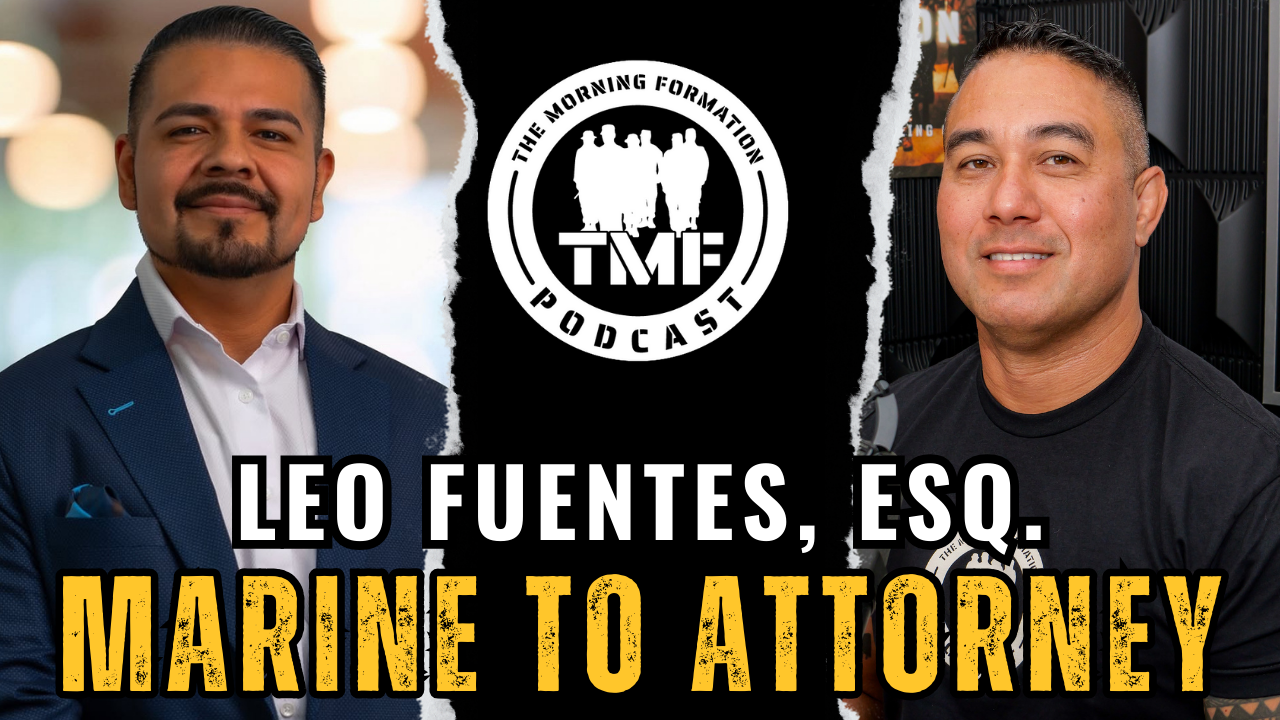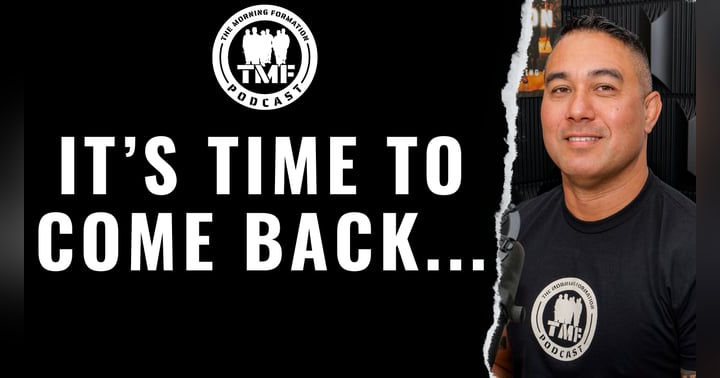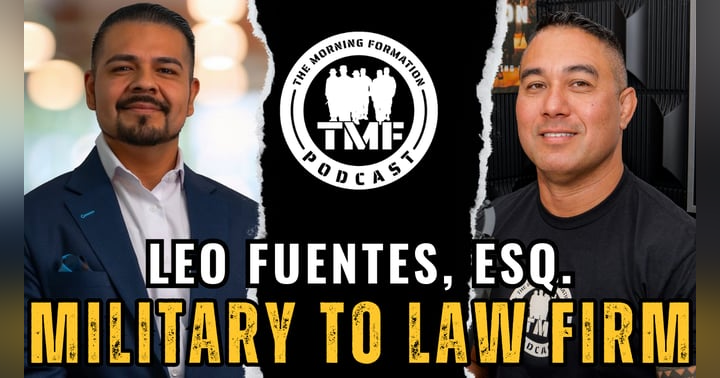From Marine to Esquire: How Military Leadership Translates to Legal Success

This blog post delves into the remarkable journey of Leo Fuentes, a Marine Corps veteran who transitioned his military leadership skills into a thriving legal career in California. We'll explore how the discipline, strategic thinking, and unwavering commitment instilled in him during his time in the Marines paved the way for his success in the courtroom. Just like the compelling conversation we had in our latest podcast episode, Serving Beyond the Uniform: A Marine's Journey to Law with Leo Fuentes, Esq., we will explore the unique advantages his military experience gave him in the legal field and how he leverages those skills to serve his clients, especially fellow veterans. You can find more details on our conversation here.
Introduction: From the Battlefield to the Courtroom
The transition from military service to civilian life can be a daunting one, filled with uncertainty and challenges. Many veterans struggle to translate their highly specialized skills and experiences into a civilian context. However, some individuals, like Leo Fuentes, have found remarkable success by leveraging their military training and mindset in unexpected fields. Fuentes' journey from the rigorous training grounds of the Marine Corps to the demanding world of law offers a compelling example of how military leadership can be a powerful asset in achieving professional goals. His story highlights the inherent value of the skills honed in the military, such as discipline, strategic planning, and unwavering dedication, and how they can be effectively applied to achieve success in a civilian career.
Leo Fuentes: A Marine's Origin Story
Leo Fuentes' path to becoming an attorney was far from traditional. He grew up in a challenging environment, facing the temptations and dangers of neighborhood gang violence. At the young age of 18, seeking a different path and a brighter future, he made the life-altering decision to enlist in the United States Marine Corps. For Leo, the Marines weren't just a job; it was an escape, an opportunity to create a better life for himself and his family. This decision reflects a deep-seated desire for self-improvement and a willingness to embrace discipline and structure – qualities that would later serve him well in his legal career. His early experiences instilled in him a sense of resilience and a determination to overcome obstacles, traits that would become hallmarks of his personal and professional life.
Leadership Forged in the Crucible of the Marine Corps
The Marine Corps is renowned for its rigorous training and its emphasis on leadership development. Fuentes' time in the Marines proved to be a crucible where his leadership abilities were forged. He rose through the ranks quickly, gaining invaluable experience in leading and managing teams. Remarkably, at just 19 years old, he found himself in charge of troops who were significantly older and more experienced than him. This experience forced him to develop his leadership skills rapidly, learning to command respect, inspire confidence, and make critical decisions under pressure. The Marines instilled in him a deep understanding of teamwork, communication, and the importance of setting a clear vision and motivating others to achieve common goals. These leadership skills, honed in the demanding environment of the military, would later prove to be invaluable in his legal career, enabling him to effectively manage cases, lead legal teams, and advocate for his clients with unwavering conviction.
Bridging the Gap: Military Skills in Civilian Life
One of the most significant challenges faced by transitioning service members is adapting to the cultural differences between the military and civilian worlds. The military operates on a hierarchical structure with clear lines of authority and a strong emphasis on obedience and discipline. Civilian life, on the other hand, is often more ambiguous and less structured. Fuentes emphasized the importance of adjusting expectations when transitioning to civilian life. He learned that not everyone operates with the same sense of urgency, discipline, and directness as those in the military. This understanding was crucial in his ability to successfully navigate the civilian world and build relationships with colleagues, clients, and opposing counsel. By recognizing and respecting these differences, he was able to effectively leverage his military skills while adapting to the nuances of civilian culture. This adaptability proved to be a key factor in his smooth transition and his ultimate success in the legal profession.
Conquering the California Bar: Discipline as a Deciding Factor
The California Bar Exam is notoriously difficult, with a pass rate that hovers around 32%. It requires not only a comprehensive understanding of the law but also immense discipline, perseverance, and the ability to perform under intense pressure. Fuentes attributes his success in passing the California Bar Exam to the discipline and work ethic he developed in the Marine Corps. He approached the exam with the same level of dedication and focus that he had applied to his military training. He developed a rigorous study schedule, stuck to it religiously, and refused to be deterred by the challenges and setbacks that inevitably arise during the bar exam preparation process. His military training had instilled in him the ability to push through adversity, maintain focus in the face of distractions, and never give up on his goals. This unwavering discipline proved to be the deciding factor in his success, enabling him to conquer one of the most challenging hurdles in the legal profession and launch his career as a California attorney.
A Unique Connection: Serving Veteran Clients
Fuentes' military background provides him with a unique advantage when representing veteran clients. He understands their experiences, their values, and the challenges they face. This shared understanding allows him to build a strong rapport with his veteran clients, fostering a sense of trust and connection that is often difficult to achieve between attorneys and clients from different backgrounds. When a veteran walks into his office and learns that he is also a Marine, there is an immediate sense of camaraderie and mutual respect. This connection allows him to effectively advocate for his veteran clients, understanding their needs and fighting for their rights with a deep sense of empathy and commitment. He can speak their language, understand their struggles, and relate to their experiences in a way that few other attorneys can. This unique connection has not only been personally rewarding for Fuentes but has also enabled him to provide exceptional legal representation to a community that he deeply cares about.
Family Legacy: A Brotherhood in Arms
Fuentes' decision to join the Marine Corps had a profound impact on his family. Inspired by his example, three of his brothers followed in his footsteps and also served in the Marines. This created a unique family legacy of service and a strong sense of brotherhood. The shared experience of serving in the Marine Corps has forged an unbreakable bond between the brothers, providing them with a deep understanding of each other's values, sacrifices, and challenges. This family legacy serves as a constant reminder of the importance of service, duty, and commitment to something larger than oneself. It also provides Fuentes with a strong support system, as he can always turn to his brothers for advice, encouragement, and a shared understanding of the challenges and rewards of serving in the military and transitioning to civilian life.
Fighting for the Underdog: Purpose in the Legal System
Fuentes' work as an attorney is driven by a deep sense of purpose. He finds particular satisfaction in representing clients who are facing powerful opponents, particularly those who are marginalized or disadvantaged. He enjoys the challenge of defending the underdog and fighting for justice on behalf of those who might otherwise be overlooked or taken advantage of. This sense of purpose stems from his own experiences growing up in a challenging environment and his desire to make a positive impact on the lives of others. He sees the law as a tool for social justice and uses his legal skills to advocate for those who need it most. This commitment to serving the underserved is a direct reflection of the values instilled in him during his time in the Marine Corps, where service to others is considered a core principle.
The Marine Mindset: Service and Advocacy
The Marine Corps instills a strong sense of service in its members, emphasizing the importance of putting the needs of others before one's own. Fuentes has carried this mindset with him into his legal career, viewing his work as an attorney as a form of service. He sees himself as an advocate for his clients, fighting for their rights and ensuring that they receive fair treatment under the law. He approaches each case with the same level of dedication, commitment, and attention to detail that he learned in the Marines. He understands that his clients are often facing difficult and stressful situations, and he strives to provide them with not only legal expertise but also with compassion, understanding, and unwavering support. This commitment to service and advocacy is at the heart of his legal practice and is a testament to the enduring impact of his military training on his personal and professional life.
Advice for Transitioning Service Members
Based on his own experiences, Fuentes offers valuable advice to transitioning service members who are considering pursuing a career in law or other civilian fields. He emphasizes the importance of starting to plan your exit strategy early, even if you think you'll serve 20+ years. The transition from military to civilian life requires careful planning and preparation, and it's never too early to start thinking about your goals and how you can achieve them. He also encourages service members to utilize tuition assistance while active duty and to save their GI Bill for future educational opportunities. He stresses the importance of seeking mentorship from veterans who have successfully transitioned to civilian careers, as they can provide valuable guidance and support. Finally, he reminds transitioning service members that they don't have to navigate the transition alone. There are numerous resources and organizations available to help veterans succeed in civilian life, and it's important to reach out for help when needed.
Conclusion: A Testament to Service and Success
Leo Fuentes' journey from Marine to Esquire is a powerful testament to the value of military leadership skills in achieving success in civilian life. His story demonstrates how the discipline, strategic thinking, and unwavering commitment instilled in him during his time in the Marine Corps paved the way for his thriving legal career. His success is not only a personal achievement but also an inspiration to other transitioning service members who are seeking to leverage their military experience in new and meaningful ways. By sharing his story, Fuentes hopes to encourage other veterans to pursue their dreams, overcome challenges, and continue to serve their communities in new and impactful ways. This journey perfectly exemplifies the themes we explored in our recent episode, Serving Beyond the Uniform: A Marine's Journey to Law with Leo Fuentes, Esq.. Just as we discussed on the podcast, Leo's story is a powerful reminder that service doesn't end with the uniform; it continues in the courtroom and beyond.






